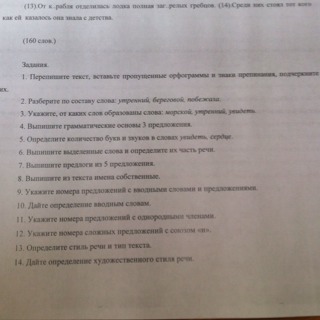Предмет: Русский язык,
автор: lisenkokarina
СРОЧНО ПОМОГИТЕ!!! Это текст и ниже задания.
Был утренний час, и туман еще не рассеялся. В нем едва были видны очертания огромного корабля. Береговой ветер лениво теребил паруса, но, наконец, он усилился и развернул их. Все на корабле было белым, кроме парусов из яркого алого шелка.
Ассоль сидела у окна и читала, но вдруг она заметила на синей небесной глади белый корабль с алыми парусами. Она вздрогнула, замерла, потом резко вскочила и побежала к морю. Сердце ее билось сильно-сильно. Временами то крыша, то забор скрывали от нее алые паруса. Тогда Ассоль торопилась миновать препятствие и снова увидеть корабль, боясь, чтобы он не исчез, как призрак. Мужчины, женщины и дети деревни – все мчались к берегу кто в чем был. Скоро у воды образовалась толпа, и в эту толпу стремительно вбежала Ассоль. Все смолкли, со страхом отошли от нее, и она осталась одна, растерянная, счастливая, беспомощно протянув руки к высокому кораблю.
От корабля отделилась лодка, полная загорелых гребцов. Среди них стоял тот, кого, как ей казалось, она знала с детства.
Приложения:

lisenkokarina:
немного размыто, но прочитать можно
Ответы
Автор ответа:
30
1. Текст уже написан
2. По составу:
Утренний: корень -утр-, суффикс -енн-, окончание -ий-, основа -утренн-.
Береговой: корень -берег-, суффикс -ов-, окончание -ой-, основа -берегов-.
Побежала: приставка -по-, корень -беж-, суффиксы -а-, -л-, окончание -а-,
основа -побежа-.
3. Морской <= море (суффиксальный способ, при помощи суффикса -ск-)
Утренний <= утро (суффиксальный способ, при помощи суффикса -енн-)
Увидеть <= видеть (приставочный способ, при помощи приставки -у-)
4. 1) Ветер теребил
2) Он усилился, развернул
5. Увидеть: 7 букв, 6 звуков; сердце: 6 букв, 5 звуков.
6. Слова не выделены.
7. У, на, с
8. Ассоль
9. 3-е и самое последнее в тексте
10. Наконец - вводное слово класса "связь мыслей, их последовательность в тексте"
11. 3, 6, 8, 9, 10, 12
12. 1, 11, 12
13. Стиль: художественный
Тип: повествование
14. Художественный стиль речи - это тот стиль речи, который применяется в художественной литературе.
2. По составу:
Утренний: корень -утр-, суффикс -енн-, окончание -ий-, основа -утренн-.
Береговой: корень -берег-, суффикс -ов-, окончание -ой-, основа -берегов-.
Побежала: приставка -по-, корень -беж-, суффиксы -а-, -л-, окончание -а-,
основа -побежа-.
3. Морской <= море (суффиксальный способ, при помощи суффикса -ск-)
Утренний <= утро (суффиксальный способ, при помощи суффикса -енн-)
Увидеть <= видеть (приставочный способ, при помощи приставки -у-)
4. 1) Ветер теребил
2) Он усилился, развернул
5. Увидеть: 7 букв, 6 звуков; сердце: 6 букв, 5 звуков.
6. Слова не выделены.
7. У, на, с
8. Ассоль
9. 3-е и самое последнее в тексте
10. Наконец - вводное слово класса "связь мыслей, их последовательность в тексте"
11. 3, 6, 8, 9, 10, 12
12. 1, 11, 12
13. Стиль: художественный
Тип: повествование
14. Художественный стиль речи - это тот стиль речи, который применяется в художественной литературе.
Похожие вопросы
Предмет: Английский язык,
автор: shchipakinas
Предмет: Русский язык,
автор: викзу
Предмет: Русский язык,
автор: yushenko2000
Предмет: Қазақ тiлi,
автор: kmurzamuratova
Предмет: Биология,
автор: Alaskhanhasin2003